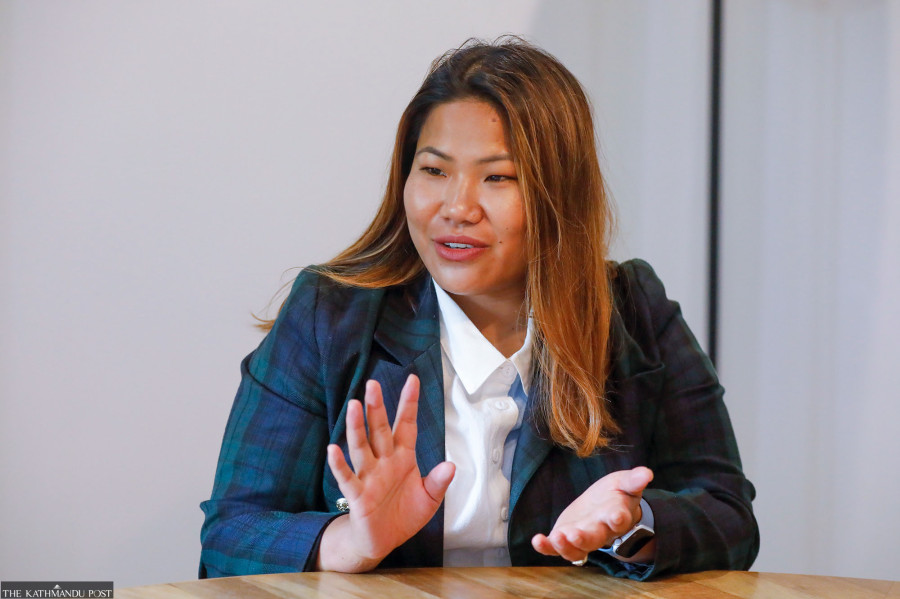Culture & Lifestyle
Master of the 64 squares
The winner of Nepal’s first women’s chess championship, Monalisha Khamboo, reflects on the many hardships she has faced over the years simply for being a female player.
Apecksha Gurung
At the 2010 Asian Games in Guangzhou, China, Monalisha Khamboo was preparing herself for a game. That’s when someone walked up to her and said, “Chess is a game for smart people. Rai ko pani buddhi huncha? (Are Rais smart enough to play chess?” This was not an isolated incident. Khamboo’s chess journey is filled with instances when she was underestimated, demoralised and at times, even threatened.
Khamboo fell in love with chess at a very young age. She liked the fact that you could just sit indoors and let your mind do the playing. Moreover, because of her introversion, she found a sense of comfort in it. Khamboo also had a slight speech impediment as a child. “I went through a difficult period where I suffered punishment for being misunderstood. That’s when chess became my safe space,” she says.
In June of 2005, Khamboo played chess formally for the first time in an inter-school competition and participated in the Under-19 Chess Championship. In 2008, Khamboo became the first National Women’s Chess Champion. This was the first time a women’s national championship in chess was held in Nepal, 29 years after the first men’s championship.
Her chess tactics are fairly simple. She doesn’t adhere to strict rules but plays each of her games with some strategy. “In the game, there is an opening, middle and ending session. I study the game slowly and implement my strategy. If my opponent makes a single mistake, that’s a plus point for me,” she says. “But strategies can only get you so far, if you don’t have the support from the management team.”
“I have worked incredibly hard for everything. But because I was one of the earliest female chess players, it was very challenging,” she reveals. As Khamboo started becoming confident in her chess skills, she started vocalising her issues with how female chess players were treated in comparison to men. This didn’t go down well with the members of the then Nepal Chess Association (NCA)—now known as the Nepal Chess Federation (NCF). “There was this belief that if there were more female players, they would replace the men in terms of money and fame,” she says, adding that she was often treated as an outsider which often got lonely.
It was in August of 2014 that Khamboo’s experience with the NCA reached a melting point. When the national women’s chess team was in Norway for a competition, she alleges that she was benched during their entire event and not allowed to sit for any games. “If I had played at least seven rounds, I would have received the Women Candidate Master, but they didn’t let me play. I would have represented Nepal in the global sphere but I was deprived of that title,” she says.
Khamboo also reveals that because of being excluded from the first four rounds, her mental health was in a very vulnerable state. “I had never experienced such an awful feeling before,” she laments. Moreover, she alleges that she often got threatening phone calls that pressured her to quit chess altogether. When she returned to Nepal, her parents decided that the chess community was not the right fit for her. Seeing her struggle so much mentally, her parents told her to stop playing chess and focus on furthering her career in other fields.
But chess was and has always been her calling. She decided not to give up. She participated in the 2019 Asian Amateur Chess Championship and the FIDE World Junior Chess Championship in Delhi as an arbiter. Legitimised by the International Chess Federation (also known by its French acronym FIDE), she now holds the title of Woman Candidate Master, as well as FIDE Instructor. Since November 2022, she is also a member of the FIDE’s Women’s Commission.
At the national level, Khamboo is the recently elected Deputy General Secretary of NCF. The election took place on March 18. “The recent election was a difficult experience. I went to three provinces–Koshi, Bagmati and Lumbini and spoke about women’s participation in chess,” she reveals. With her new role, she wants to come up with programs that grants scholarships to women who play chess at the club level and pledges to implement a more inclusive chess policy that encourages female participation. She also mentions that even in chess, one needs political backup as a means to sustain otherwise it can get difficult and ugly. “I want to support future female players who feel like they have nobody to rely on.”
Her new position at the NCF has made her chess journey come full circle. “I guess that’s life. Now those who didn't want me to win have to see my face for four years.” says Khamboo.
She believes that NCF is yet to create a women-friendly environment, wherein women chess players are acknowledged and respected. Her second master’s degree in gender studies from Tribhuvan University has opened her mind to the various nuances and constructions of patriarchy. “I hope to incorporate my learnings in the work that I do,” she says.
If she was still the same person as a decade ago, she would have been overwhelmed with all the challenges she continues to face even today. But this time around, she has courage and resistance. “I am a warrior. It was a lot of struggle but I am glad to be where I stand today.”




 14.24°C Kathmandu
14.24°C Kathmandu



.jpg&w=200&height=120)











